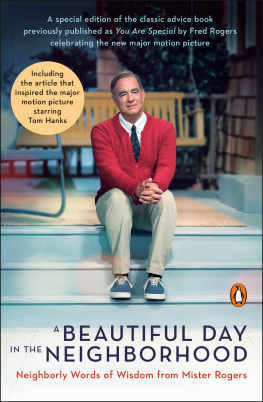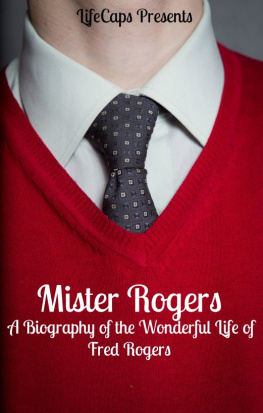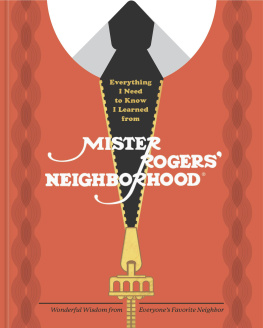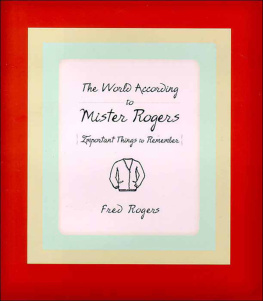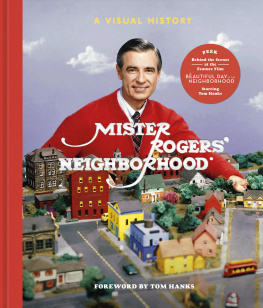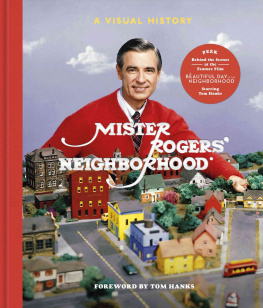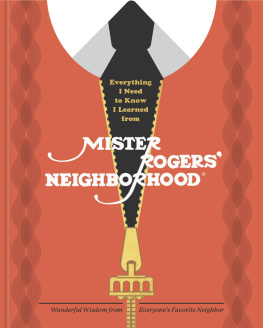Dr. Anita Knight Kuhnley - The Mister Rogers Effect
Here you can read online Dr. Anita Knight Kuhnley - The Mister Rogers Effect full text of the book (entire story) in english for free. Download pdf and epub, get meaning, cover and reviews about this ebook. year: 2020, publisher: Baker Publishing Group, genre: Home and family. Description of the work, (preface) as well as reviews are available. Best literature library LitArk.com created for fans of good reading and offers a wide selection of genres:
Romance novel
Science fiction
Adventure
Detective
Science
History
Home and family
Prose
Art
Politics
Computer
Non-fiction
Religion
Business
Children
Humor
Choose a favorite category and find really read worthwhile books. Enjoy immersion in the world of imagination, feel the emotions of the characters or learn something new for yourself, make an fascinating discovery.
- Book:The Mister Rogers Effect
- Author:
- Publisher:Baker Publishing Group
- Genre:
- Year:2020
- Rating:3 / 5
- Favourites:Add to favourites
- Your mark:
- 60
- 1
- 2
- 3
- 4
- 5
The Mister Rogers Effect: summary, description and annotation
We offer to read an annotation, description, summary or preface (depends on what the author of the book "The Mister Rogers Effect" wrote himself). If you haven't found the necessary information about the book — write in the comments, we will try to find it.
The Mister Rogers Effect — read online for free the complete book (whole text) full work
Below is the text of the book, divided by pages. System saving the place of the last page read, allows you to conveniently read the book "The Mister Rogers Effect" online for free, without having to search again every time where you left off. Put a bookmark, and you can go to the page where you finished reading at any time.
Font size:
Interval:
Bookmark:
2020 by Anita Knight Kuhnley
Published by Baker Books
a division of Baker Publishing Group
PO Box 6287, Grand Rapids, MI 49516-6287
www.bakerbooks.com
Ebook edition created 2020
All rights reserved. No part of this publication may be reproduced, stored in a retrieval system, or transmitted in any form or by any meansfor example, electronic, photocopy, recordingwithout the prior written permission of the publisher. The only exception is brief quotations in printed reviews.
Library of Congress Cataloging-in-Publication Data is on file at the Library of Congress, Washington, DC.
ISBN 978-1-4934-2775-8
The author is represented by Hartline Literary Agency.
In loving memory of my Mims
my grandmother.
She was also known as Dr. Ida Molina-Zinam.She consistently brought out the best in herself and others. At ninety-one years young,
Mims died during the preparation
of this manuscript, but her last prayer
with me was for the readers of this book
and for the positive effect that it
would have on them. Thank you for helping
me honor her memory.
Cover
Half Title Page
Title Page
Copyright Page
Dedication
Part 1: Mister Rogers
A World without Mister Rogers
The Mister Rogers Effect
Part 2: The Seven Secrets
SECRET 1: Listen First
Listen with More than Your Ears
SECRET 2: Validate
Feelings Feelings Are Mentionable and Manageable
SECRET 3: Pause and Think
Take Time to Discover What Is Inside
SECRET 4: Show Gratitude
Be Kind and Be Thankful
SECRET 5: Develop Empathy
Be with People Where They Are
SECRET 6: Practice Acceptance
Who You Are Right Now Is Acceptable
SECRET 7: Establish Security
People Need to Know They Are Cared For
Closing Thoughts: Does Mister Rogers Still Live in Your Neighborhood?
Acknowledgments
Notes
About the Author
Back Ads
Back Cover
Many have said, We need a Mr. Rogers in our world today. I believe that if you cant find a Mr. Rogers, you can certainly be one. Internalize his message and be a healing, calming presence. I fail miserably, but Im trying.
comment on YouTube video Remembering Mr. Rogers, a video interview with Charlie Rose, televised in 1994
I will never forget the day I had a discussion with my students that would send me on a transformative quest. It was quiet in the large, dark classroom filled with aspiring counselors. I flipped on the fluorescent lights and looked out into the sea of faces. The powerful video clip had ended, and there were a few moments of contemplative silence before sniffles could be heard and tear-filled eyes met mine. After pausing for a moment, I asked, What was it like for you to watch this video of Mister Rogers advocating for public television, addressing Senator Pastore, and talking about how to address anger?
One student raised her hand. With sadness in her voice, she said, I work in inner-city schools where we see children from all sorts of backgrounds, like single-parent homes, poverty, immigration. The kids I work with dont have a Mister Rogers. They have no one to teach them how to regulate their emotions, so they turn to violence. When they get angry, they fight. This was the beginning of a lively discussion.
That evening, while taking my dogs for a walk, I remembered my students words: They have no one. Some children have no safe adult to talk to; they have the sense that no one cares. They fall victim to an adult with no knowledge of how to regulate their own anger, then consequently turn to violence, grow up, and in turn hurt their own children. As kids, they likely longed for an escape from the violence, for someone to rescue them from people who did not know what to do with their angeruntil they, too, adopted their parents ways for lack of an alternative.
I knew I had to do something. I set out on a quest to uncover the psychological principles that Rogers used to transform Senator Pastore from his hostile and angry state of mind to a collaborative, friendly, even admiring ally. Mister Rogers skirted past Pastores defenses to his vulnerable inner child and engaged in authentic connection (we work at unraveling this mystery in more detail in secret 2).
Rogers offered an alternativesomething delightfully incongruent with the path of least resistance. What he offered was hope of a safe world for the young child in all of us and for our children and all the children of tomorrow. Compelled by something beyond myself, I knew I had to use the research tools that I had acquired through my training and the lens of psychology to unpack the mysterious principles that characterized his life and work. I set out to learn all that Mister Rogers embodied and generously offered to those around him. These findings became the source material I used to unravel the top seven psychological principles Rogers used to make a differencelest my students and other adults continue to believe there is no hope for future generations.
Armed with my background in qualitative research, a panel of psychological experts, my own psychological training, and my toolspsychological principles, writing, and storytellingI set out to identify and share the hope that comes with a step-by-step plan that we, Mister Rogerss television neighbors, can use to build a strong tower and refuge to protect the children (and the inner child in all of us). My work begs them not to believe the lie and reveals that there is an alternative; they can work through their anger because there is hope, and there are caring adults who will help them. This theme was one of the most salient concepts that emerged from Mister Rogerss work.
Mister Rogers Spoke to the Neglected and Lonely in Us
Mister Rogers spoke to the neglected inside all of usthe part of us that believes we need to work hard to earn any inkling of love in this world, that believes just maybe if I can work hard enough, produce enough, or be good enough at something, then someone will love me. He reached straight past the expert striver, worker, and producer into a place deep inside of us. He cared deeply for his viewers, or television neighbors as he often referred to us, and he communicated this in every program, wherever he was, and whomever he was with.
His song Its You I Like is a radical message of acceptance and care, and he sang it often, sometimes personalizing the lyrics. When he appeared with comedian Joan Rivers, he improvised the words to match her personality: Its you I like, its not your jokes. And for a young Jeffrey Erlanger, who used a wheelchair, he threw in, Its not your fancy chair. Jeffrey and Joan, from such different walks of life, each appeared awestruck for a moment, shocked with such surprise and wonder that they didnt know what to do. Joan Rivers pulled up Rogerss cardigan sweater, which she had been wearing, around her head and hid for a moment. Then she quickly removed it and smiled at Rogers as he continued singing straight to her heart.
It is as if Rogers knew that simply becoming familiar with someone was shallow water; instead he always pursued the deep dive. He was not satisfied with small talk or just knowing what was on the outside; he pursued true knowing and intimacy with everyone he met.
Rogers could reach the inner orphan, the lost and lonely, the down and out or the high and mighty. It did not really matter who was in front of himhe wanted to search for the good in that person. Perhaps the day he was bullied as a child for his outer appearance was the day he developed new eyes to search for the best in his neighbors and to truly know them. This was demonstrated over and over in his interactions with others both privately and publicly. He started each show by inviting his viewers to belong, to be his neighbors, and he ended each show with expressions of care.
Font size:
Interval:
Bookmark:
Similar books «The Mister Rogers Effect»
Look at similar books to The Mister Rogers Effect. We have selected literature similar in name and meaning in the hope of providing readers with more options to find new, interesting, not yet read works.
Discussion, reviews of the book The Mister Rogers Effect and just readers' own opinions. Leave your comments, write what you think about the work, its meaning or the main characters. Specify what exactly you liked and what you didn't like, and why you think so.





